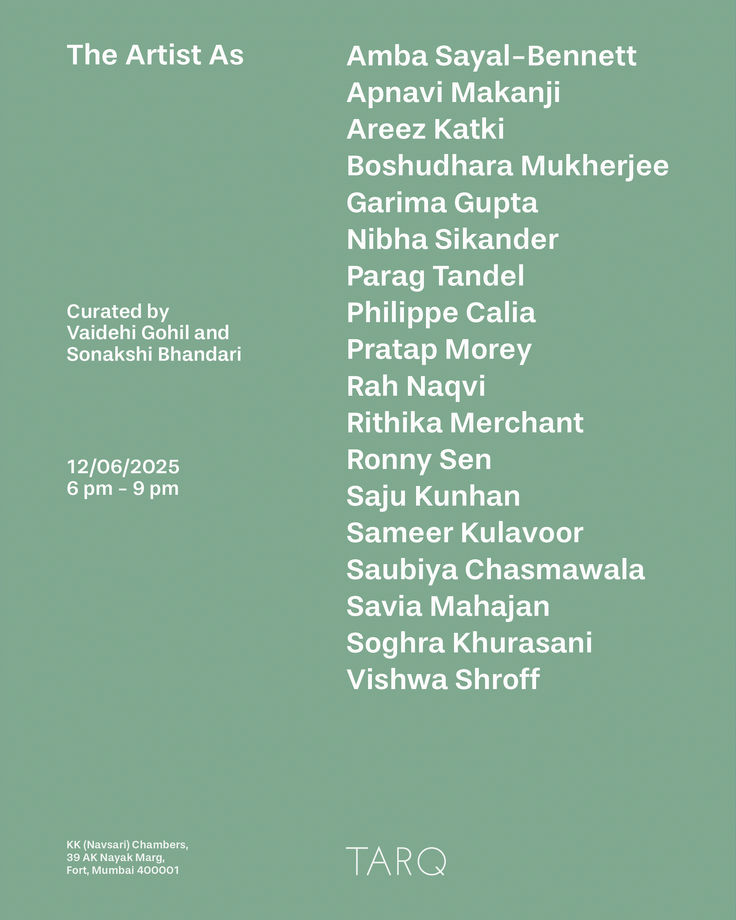Featuring all eighteen artists from TARQ’s program, the exhibition invites artists to inhabit the many roles, ideas and positions that characterise their practice–positions that are not assumed but also lived. From storyteller to autobiographer, from emotion to space, this exhibition asks: what is the artist, if not also a gatherer, a dreamer, an observer, a constructor of meaning?
Each artists' presentation centres on a singular chosen role. Together, the works in the show build a shared space of ‘becoming’ where process becomes part of content. Through this lens, the works are presented alongside research materials, tools, notes, and other fragments of process that are often hidden away in studios or archives.
Viewers are invited to move between finished works and trajectories of process, rethinking the traditional notions separating them. Nibha Sikander (As Entomophile), Savia Mahajan (As Vessel), Pratap Morey (As Observer), and Boshudhara Mukherjee (As Collector) share a material intimacy. Their presentations include objects from their process, highlighting how structure, texture, and repetition become ways of thinking through form. These materials eventually take on the most unexpected forms— whether it is Sikander and Morey’s use of paper; Mukherjee’s use of shredded fabric; or Mahajan’s alchemy with pigments.
In other corners, Garima Gupta (As Researcher) and Apnavi Makanji (As Methodology) present research- driven works with citations that open up long-term engagements with ecology, power, and politics. Field notes and readings speak to the depth and complexity of their inquiries.
Saju Kunhan (As Chronicler), Areez Katki (As Archivist), Rithika Merchant (As Storyteller), and Parag Tandel (As Visual Autoethnographer) turn to histories—familial, historical, oral, and cultural respectively. Their works move through memory, archive, storytelling, and tradition, offering personal responses to collective narratives in the forms of three dimensional works, that are a departure from their regular practice.
Questions of identity, interiority, and relationships are explored by Saubiya Chasmawala (As Autobiographer), Soghra Khurasani (As Ehsasat), Rah Naqvi (As Dialogue), and Philippe Calia (As Friend). Through gestures, objects, and photographs, they reflect on connection, emotion, and shared experiences.
Sameer Kulavoor (As City) and Ronny Sen (As Transit) respond to the contemporary city—its architectures, gaps, and transience. Their two dimensional works hold moments of stillness within shifting urban landscapes. Using a similar spatial vocabulary to draft a language of structure, perception, and place, Amba Sayal-Bennett (As Draftsman) and Vishwa Shroff (As Space) engage with built environments through line, drawing, and memory.
“Through a curatorial methodology that encourages collaboration with the artists, a series of interconnected moments of conversations and discussions come together in this exhibition to create a new discursive space around artistic practice” writes Vaidehi Gohil.
CLICK HERE TO ENTER THE ONLINE VIEWING ROOM
CLICK HERE TO READ THE EXHIBITION HANDOUT
About the Curators
Vaidehi Gohil is a writer and researcher with a postgraduate degree in Art History and Aesthetics from Maharaja Sayajirao University, Vadodara. She specializes in modern and contemporary art, drawn to its relatability, accessibility, and potential for critical research. Her master's dissertation intended to critically engage with the curatorial premises that emerge while tackling complex questions of transnationalism and crossing of cultural knowledge in curating contemporary Indian art abroad.
In 2024, she was awarded the Curatorial Fellowship by Gallerie Splash, where she curated an exhibition titled ‘Yesterday Came Suddenly’ at the Bikaner House, New Delhi. Vaidehi has consistently worked across various roles within the arts—including editorial contributions at Saffronart—building a well-rounded perspective through her engagement with research, writing, curation and arts management. She currently works with TARQ, Mumbai.
Sonakshi Bhandari is a creative professional with a background in Communication Design from ISDI Parsons, Mumbai. As part of her undergraduate thesis, she directed On The Move, a documentary film exploring the lives of the Gaddis, a pastoral community in Himachal Pradesh. The film was selected for the Living Lightly Film Festival on Pastoralism in partnership with Srishti Films (2020), marking a key milestone in her engagement with culturally rooted narratives.
In her current role as the Sales Director at TARQ, she is involved in the planning and execution of exhibitions, as well as the development of private art collections. She co-runs TASO, a creative design practice focused on visual storytelling, brand identity design, and cross-disciplinary projects. Her practice is rooted in interdisciplinary thinking, bridging her interests in contemporary art and design.


















